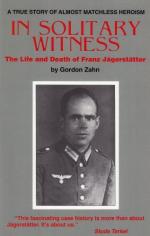
|
| Name: _________________________ | Period: ___________________ |
This test consists of 15 multiple choice questions and 5 short answer questions.
Multiple Choice Questions
1. How far from the highway was Jagerstatter's home town located?
(a) About 1 mile.
(b) About 10 miles.
(c) About 7 miles.
(d) About 5 miles.
2. What did Jagerstatter equate the dark time of Hitler's entry in Austria to?
(a) To the French deciding to follow Napoleon.
(b) To a nuclear winter.
(c) To the Jew's decision to free Barabbas.
(d) To a solar eclipse.
3. How did people describe Jagerstatter in his youth?
(a) Quiet.
(b) Very pious.
(c) Dangerous.
(d) Somewhat wild.
4. What did Jagerstatter tell his wife he could not receive in the April 9 letter?
(a) Money.
(b) Books.
(c) Visits.
(d) Food.
5. What decision was not a surprise for Jagerstatter's wife?
(a) His refusal to serve in the military.
(b) His unwillingness to follow his heart.
(c) His willingness to defect to Russia.
(d) His refusal to attend mass.
6. Who does Jagerstatter say were always persecuted?
(a) Freedom fighters.
(b) Christians.
(c) Jews.
(d) Nazis.
7. What was common knowledge in Jagerstatter's village according to Zahn?
(a) Jagerstatter's refusal to serve in the Nazi military.
(b) That Jagerstatter was Jewish.
(c) That Jagerstatter was insane.
(d) That the Nazis were losing the war.
8. What does Zahn say about Jagerstatter's parents?
(a) They were not in love.
(b) They were not married.
(c) They were old.
(d) They were from Berlin.
9. What was Jagerstatter accused of after the vote?
(a) Being a Nazi spy.
(b) Putting the village at risk.
(c) Being a Communist.
(d) Not producing enough on his farm.
10. What did Rev. Franz Baldinger tell Jagerstatter to accept?
(a) That he was chosen.
(b) That the Nazi regime was good for Christians.
(c) That he would die.
(d) That he would have to serve in the military.
11. What didn't make much of a difference in daily life?
(a) Nazi rules.
(b) The war.
(c) Jagerstatter's faith.
(d) The lack of food in the village.
12. What did Jagerstatter 's wife say Jagerstatter continued to do, contrary to popular belief?
(a) Sleep around.
(b) Fast.
(c) Go to Church.
(d) Drink alcohol.
13. What was Jagerstatter's religion?
(a) Protestant.
(b) Catholic.
(c) Scientology.
(d) Jehovah's Witness.
14. What did Jagerstatter substitute for the proclamation, Heil Hitler?
(a) Hamm hitler.
(b) Fufu Hitler.
(c) Gart Hitler.
(d) Pfui Hitler.
15. What did Jagerstatter refuse?
(a) Food donations.
(b) Government subsidies.
(c) To go to Berlin.
(d) The rule of the law.
Short Answer Questions
1. What does Zahn say Jagerstatter underwent before his arrest?
2. What gift did Jagerstatter receive from his daughter, Rosalie?
3. What did Jagerstatter sometimes do for the needy?
4. What possible explanation to the blotched nature of the April 9 letter does Zahn give?
5. What highway was Jagerstatter 's hometown located near?
|
This section contains 470 words (approx. 2 pages at 300 words per page) |

|




